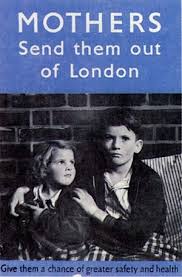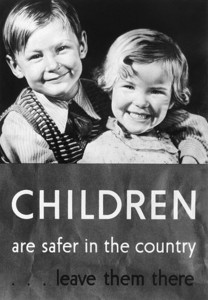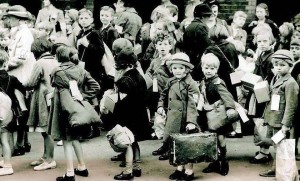World War 2 Evacuees
An Evacuees Story
As told to Ken Harris and Frankie Fisher
My brother and I were evacuated to Swanbourne from Edmonton on the 27th September 1940. I was aged four years and four months; my brother was nine years old.
When we arrived we were ushered into a hall where I remember food was served, including the ubiquitous rice pudding with the usual war time instruction “Eat it all up – men have risked their lives to bring you that!” When we had eaten, we were lined up opposite the New Walk. Villagers came along and started to choose individuals. I noticed a woman at the top of the walk wearing a black beret, trench coat and Wellingtons – Aunty Mabel! She slowly walked along the line, stopped opposite my brother and asked him how old he was. My mother had given us strict instructions that we were to stay together. Before my brother could respond to Aunty Mabel’s question, I said “We are together”. With that, she turned to a man with a clipboard and said “I’ll take these two then”.
Thus started two of the happiest years of my life. Our “billet” was to be Pear Tree Cottage (10 Nearton End) with Mabel and Arthur White and Mabel’s widowed mother known to us as “Grandma Willis”. The cottage is little changed today from those years ago other than the large pebbled path. This has been replaced, as has the pump. The pump I remember, where people had a natter (gossip). Back to the cottage – its amenities were let’s say spartan ! No electricity – no gas – no running water. The outside toilet had a wooden plank with two holes in it, one for the adults and one for the children. I always used the adults as I found it more comfortable, being smoother due to usage!
Though the cottage was spartan, the food cooked and served by Aunty Mabel was fit for a king. It was country cuisine at its best. We lived off “the lord’s table”. The first course was always served following the prayer “For what we are about to receive may the Lord make us truly grateful” with a rider “no seconds until you’ve finished your firsts!” Are you surprised that I am now a “big boy”!
Then there was the pig. He was one of two runts that Arthur decided to rear. He named them after my brother and myself. Both animals were very weak and sadly my pig did not live very long. My brothers survived only eventually to be butchered. There was some suspicion that the animal was “unregistered” as he was eaten by us and not sold on. I suppose that was within the law as it stood in war time (or in Swanbourne!). I must say he made very fine eating. I seem to remember the rearing of pigs was not allowed within a certain distance of human habitation and that ours was too near. The pig sty is still there.
The primary school. The first thing I remember was that we were shown certain plants that were poisonous – the one I remember the most was deadly nightshade. And there was one place that was strictly “out of bounds” – the pit! What the pit contained I never found out but I remember a feeling of great apprehension as I looked down into it. I wonder if any of the village elders have an explanation. Back to the primary school and my teacher was Miss Smith. Every week or two she would make a “home visit”. I’m not sure if this was official or part of her teaching duties. On one visit to us I was in the bath which was placed in front of the fire. The next morning at school she told the class about it and they laughed.
One thing that stands out in the class was a poster on the partition between the classrooms – this poster depicted a green devil who was in the process of cutting a child’s finger off – this was because the child was continuously biting his nails – so if you were seen by the teacher biting your nails she pointed to the poster. I have never bitten my nails by the way. I remember on occasions having to desk-share – this entailed a short period at a desk and then having to sit on the floor. This I believe was caused by an influx of Greek refugees in addition to ourselves but I have a feeling that a school in an adjoining village was without a teacher for a short period, resulting in a temporary overcrowding.
At school, I remember a form of rounders that was played by boys only. When the ball was struck the ball was thrown at the runner – this was to get him out – but you could punch the ball away and score.
I can only remember Tony Bartley flying over and “beating up” the village but my late father recalled having a drink with him in “The Swan” and found him a friendly and unassuming man.
Our lives revolved around the chapel and I have happy memories of worshipping there. In cold weather the women elders sat round the stove, each with a child between them. The women sat with their hands in muffs. I can remember clearly when a hand reached out of a muff and placed a chestnut on the stove and when the chestnut had roasted, it was given to me and after much juggling, etc., I was able to eat it.
We did go home on one occasion but I do not know if this happened with other children. During our stay our parents did visit as did our Aunty Lena and I remember them saying that the journey to and from Swanbourne was on occasions interrupted by air raids.
There is one incident other than that of the German bomber that strafed the village and this involved Arthur White. He and one other were working in a field when an aircraft flew over. They both looked up (you did in war time) and they noticed a black speck by the aircraft. Arthur said to his chum that the speck was much too high to be a crow. They soon realized – with some alarm – that it was a body falling to earth. On arrival at home, Arthur was very shocked, but I cannot remember the outcome. Was it an accident or suicide?
Italian prisoners of war – their singing and general demeanour showed they were very happy to be out of the war. They taught us Italian swear words. They were very friendly and would pull at your cheek and say “bambino”. They used to make baskets and items from rabbits fur which they later sold to the locals.
We left in late September 1942. I did return to Swanbourne on several occasions through the years prior to Aunty Mabel’s death. The last time I saw her, she had been stricken with arthritis. On leaving she put her arms around me and said “When you leave, it is like one of my own leaving”. I replied, “Aunt Mabel, I am one of your own”.
RETURN to the Historical Events Category




